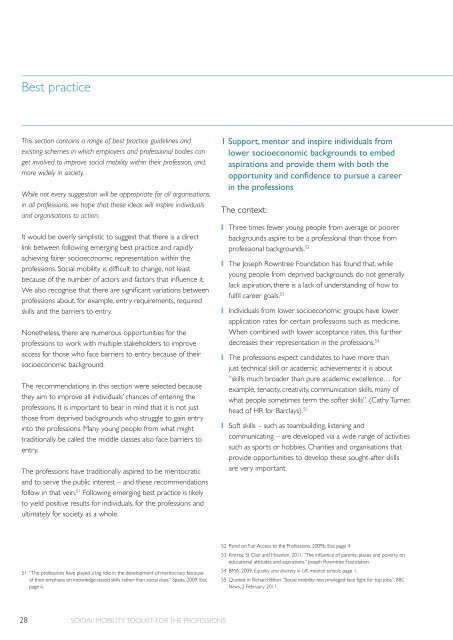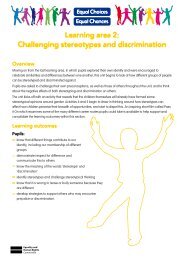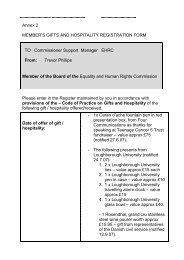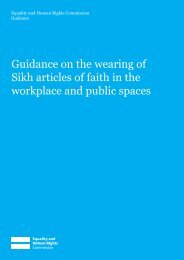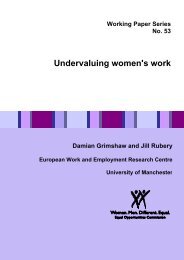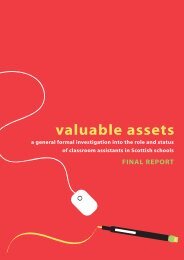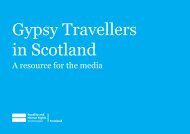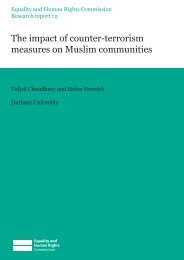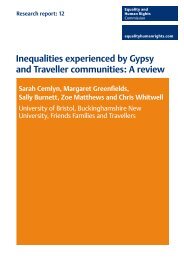Social Mobility Toolkit for the Professions - Equality and Human ...
Social Mobility Toolkit for the Professions - Equality and Human ...
Social Mobility Toolkit for the Professions - Equality and Human ...
Create successful ePaper yourself
Turn your PDF publications into a flip-book with our unique Google optimized e-Paper software.
est practice<br />
This section contains a range of best practice guidelines <strong>and</strong><br />
existing schemes in which employers <strong>and</strong> professional bodies can<br />
get involved to improve social mobility within <strong>the</strong>ir profession, <strong>and</strong>,<br />
more widely in society.<br />
While not every suggestion will be appropriate <strong>for</strong> all organisations,<br />
in all professions, we hope that <strong>the</strong>se ideas will inspire individuals<br />
<strong>and</strong> organisations to action.<br />
it would be overly simplistic to suggest that <strong>the</strong>re is a direct<br />
link between following emerging best practice <strong>and</strong> rapidly<br />
achieving fairer socioeconomic representation within <strong>the</strong><br />
professions. <strong>Social</strong> mobility is difficult to change, not least<br />
because of <strong>the</strong> number of actors <strong>and</strong> factors that influence it.<br />
We also recognise that <strong>the</strong>re are significant variations between<br />
professions about, <strong>for</strong> example, entry requirements, required<br />
skills <strong>and</strong> <strong>the</strong> barriers to entry.<br />
none<strong>the</strong>less, <strong>the</strong>re are numerous opportunities <strong>for</strong> <strong>the</strong><br />
professions to work with multiple stakeholders to improve<br />
access <strong>for</strong> those who face barriers to entry because of <strong>the</strong>ir<br />
socioeconomic background.<br />
<strong>the</strong> recommendations in this section were selected because<br />
<strong>the</strong>y aim to improve all individuals’ chances of entering <strong>the</strong><br />
professions. it is important to bear in mind that it is not just<br />
those from deprived backgrounds who struggle to gain entry<br />
into <strong>the</strong> professions. Many young people from what might<br />
traditionally be called <strong>the</strong> middle classes also face barriers to<br />
entry.<br />
<strong>the</strong> professions have traditionally aspired to be meritocratic<br />
<strong>and</strong> to serve <strong>the</strong> public interest – <strong>and</strong> <strong>the</strong>se recommendations<br />
follow in that vein. 51 Following emerging best practice is likely<br />
to yield positive results <strong>for</strong> individuals, <strong>for</strong> <strong>the</strong> professions <strong>and</strong><br />
ultimately <strong>for</strong> society as a whole.<br />
51 “<strong>the</strong> professions have played a big role in <strong>the</strong> development of meritocracy because<br />
of <strong>the</strong>ir emphasis on knowledge-based skills ra<strong>the</strong>r than social class.” Spada. 2009. Ibid,<br />
page iii.<br />
28 <strong>Social</strong> <strong>Mobility</strong> toolkit For <strong>the</strong> proFeSSionS<br />
1 Support, mentor <strong>and</strong> inspire individuals from<br />
lower socioeconomic backgrounds to embed<br />
aspirations <strong>and</strong> provide <strong>the</strong>m with both <strong>the</strong><br />
opportunity <strong>and</strong> confidence to pursue a career<br />
in <strong>the</strong> professions<br />
<strong>the</strong> context:<br />
� three times fewer young people from average or poorer<br />
backgrounds aspire to be a professional than those from<br />
professional backgrounds. 52<br />
� <strong>the</strong> Joseph rowntree Foundation has found that, while<br />
young people from deprived backgrounds do not generally<br />
lack aspiration, <strong>the</strong>re is a lack of underst<strong>and</strong>ing of how to<br />
fulfil career goals. 53<br />
� individuals from lower socioeconomic groups have lower<br />
application rates <strong>for</strong> certain professions such as medicine.<br />
When combined with lower acceptance rates, this fur<strong>the</strong>r<br />
decreases <strong>the</strong>ir representation in <strong>the</strong> professions. 54<br />
� <strong>the</strong> professions expect c<strong>and</strong>idates to have more than<br />
just technical skill or academic achievements: it is about<br />
“skills much broader than pure academic excellence… <strong>for</strong><br />
example, tenacity, creativity, communication skills, many of<br />
what people sometimes term <strong>the</strong> softer skills”. (cathy turner,<br />
head of hr <strong>for</strong> barclays). 55<br />
� Soft skills – such as teambuilding, listening <strong>and</strong><br />
communicating – are developed via a wide range of activities<br />
such as sports or hobbies. charities <strong>and</strong> organisations that<br />
provide opportunities to develop <strong>the</strong>se sought-after skills<br />
are very important.<br />
52 panel on Fair access to <strong>the</strong> professions. 2009b. Ibid, page 4.<br />
53 kintrea, St clair <strong>and</strong> houston. 2011. “<strong>the</strong> influence of parents, places <strong>and</strong> poverty on<br />
educational attitudes <strong>and</strong> aspirations.” Joseph rowntree Foundation.<br />
54 bMa. 2009. <strong>Equality</strong> <strong>and</strong> diversity in UK medical schools, page 1.<br />
55 Quoted in richard bilton. “<strong>Social</strong> mobility: less privileged face fight <strong>for</strong> top jobs”, BBC<br />
News, 2 February 2011.


